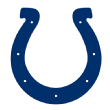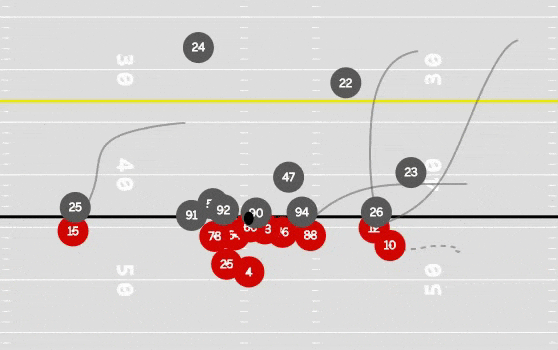Barnwell: The Week 1 disasters, and predicting which could get better

While we saw stunning performances from the Patriots and Ravens in Week 1, there were plenty of disastrous starts to the NFL season. We saw overmatched offensive lines, struggling quarterbacks and teams whose slim playoff chances seemed to extinguish into thin air before our eyes. (Sorry, Dolphins.)
Let's run through some of those wildly disappointing starts and take a closer look to try to figure out what happened. I'm expecting most of these guys to bounce back, but I'm rapidly losing faith in at least one player who was expected to hit new heights in 2019.
One player who won't show up is Baker Mayfield, as I already addressed his Week 1 performance in my Monday morning column. I evaluate five quarterbacks there and will get to three more here, including each of the starting quarterbacks we'll see in Thursday night's Bucs-Panthers matchup:
Jump to a disaster:
QBs: Newton | Winston | Roethlisberger & Co.
More: Vinatieri | Michel | Tunsil | Chubb/Miller
Cam Newton, QB, Carolina Panthers
What went wrong: One pass more than 20 yards downfield
When we last saw Newton playing meaningful football, the former NFL MVP was struggling mightily with a shoulder injury. He was horrific throwing downfield last season, posting a passer rating of 30.4 on passes 20 or more yards downfield. The league average on those throws was 93.4, and he had posted a passer rating of 93.2 on those same passes from 2015 to 2017. It was no surprise when Newton underwent shoulder surgery after the season.
In his return to meaningful football, Newton came back onto the field and ... didn't throw deep. The Panthers star threw just one of his 38 pass attempts 20-plus yards downfield in the Panthers' Week 1 loss to the Rams. That throw came on a third down in the fourth quarter, when Newton badly missed an open Curtis Samuel off a wheel route for what would have been a big gain. It felt like the Panthers only trusted him to make one deep pass and saved it for the biggest moment of the game, only for the pass to go awry.
To start, I don't think the fact that Newton threw one deep pass all game is particularly meaningful in itself. Drew Brees, for example, threw only one pass 20-plus yards downfield on Monday night, and nobody has suggested that his arm strength is compromised. Half of the league's starting quarterbacks had at least one start last season in which they threw only one 20-plus-yard pass, and guys such as Brees, Tom Brady, Philip Riversand Ben Roethlisberger had starts when they didn't even throw one.
Some of the decision to keep Newton from throwing downfield was a conscious part of the game plan. The Panthers wanted to keep Aaron Donald out of the game, which meant throwing quickly. Newton held the ball for an average of just 2.24 seconds before releasing his passes on Sunday, which was the quickest release for any Week 1 quarterback by a comfortable margin. (The league average was 2.75 seconds per pass.) He was sacked only three times, and two of those came on blown protections. The third was when Dante Fowler Jr. was matched up one-on-one against Christian McCaffrey.
After watching each of Newton's pass attempts again, though, there's a difference between the Cam of 2018 and the guy we saw against the Rams. Last year, I don't think Cam was capable of getting great velocity or the right depth on his passes downfield, especially as the season wore on. There might have been the occasional bullet, but most of his throws were essentially compromised.
In Week 1, though, Newton did have that sort of old zip on his passes, albeit on a part-time basis. He had more issues passing than the 20-yard figure might indicate, though. He seemed to be battling throughout the game, and while part of that was undoubtedly his post-surgery mechanics, it looks like he still has some discomfort in the foot he injured during the preseason. He seemed to be throwing more with his upper body and seemed uncomfortable planting and setting before his throws, especially early in the game.
As a result, several of the former first overall pick's passes sailed, including multiple attempts to open receivers on the sidelines. At the same time, he missed a leaping pass to Greg Olsen off a bootleg and sailed a drag route, neither of which were more than a few yards past the line of scrimmage. That's not arm strength; it's struggling with consistent mechanics.
The Buccaneers don't expect to present the same sort of defensive challenges as the Rams, although they did hassle Jimmy Garoppolo in a truly ugly game against the 49ers in Week 1. With a less imposing pass rush and secondary, we should get a better sense of where Newton is in his rehabilitation process. My suspicion is that we'll see more deep throws than in Week 1, but that there will still be a certain level of inconsistency in his accuracy. If he continues to average just 6.5 air yards per attempt and seems hesitant to hit open receivers downfield, there might be more cause for alarm.
Adam Vinatieri, K, Indianapolis Colts
What went wrong: Three missed kicks
For more than two decades, Vinatieri has been a rock on which his teams can rely. The 46-year-old Colts kicker has remained productive long past anyone's expectations. The most memorable kicks of his career came as a member of the Patriots, but as he enters NFL season No. 24, he has actually spent more years with the Colts (14) than the Patriots (10). He has essentially had two full-length kicking careers.
Vinatieri has remained productive into his mid-40s, but he likely cost the Colts a victory in their season opener against the Chargers. It was a shock when he pushed his first extra point attempt of the season wide, but when the veteran followed that up by missing a 46-yarder before halftime and a chip shot from 29 yards away in the fourth quarter, it seemed like something was horribly wrong. The Colts ended up losing in overtime, and Vinatieri didn't mince words in talking about his performance. "I had a lousy game," he said afterward. "I sucked."
Every kicker has a bad game here and there, and Vinatieri is no exception. The obvious concern with a kicker in his 40s, though, is that his leg might finally have hit the wall. He's in virtually uncharted territory. Including the playoffs, Vinatieri has attempted 762 field goals, more than any player in NFL history. Just two other kickers -- George Blanda and Morten Andersen -- have played anything close to a full campaign during their age-47 season; Andersen made it to 47 and Blanda to 48. (Vinatieri turns 47 in December.) Vinatieri has been an above-average kicker throughout his 40s, but Father Time arrives for everyone at some point.
Has that moment come for Vinatieri? To get a sense of where his performance from Sunday landed, I went through the entirety of his career and built a simple expected points model. I took each Vinatieri kick and assigned it an expected value given the league's success rate on kicks in that 10-yard range during the season in question. A 34-yard kick in 2003, as an example, would be worth 2.48 points, since a field goal is worth three points and kickers hit 82.7% of their attempts between 30 and 39 yards in 2003. (Since we have only one week of data for 2019, I used the 2018 percentages for his game on Sunday.)
The bad news: Sunday was Vinatieri's worst performance in nearly 20 years. By this model, he scored four points and should have scored 9.46 points, given the distance of his kicks. That 5.46-point difference is the largest in any of his performances since games against the Bills in 1996 and 1999.
For other games at the top of his list, Vinatieri has viable excuses. The 1999 game against the Bills included wind gusts topping 20 mph. The 1996 performance was the second game of his career. The 2017 appearance against the Bills was played in a snowstorm. None of those arguments applies here.
One game that narrowly misses the list, though, is the season opener in 2017 against the Rams. The kicks didn't matter much -- the Colts lost 46-9 in Sean McVay's first game in charge of the Rams -- but Vinatieri traveled to Los Angeles and missed both an extra point (wide right) and a 38-yard field goal (off the left upright). We could realistically have raised the same concerns about a then-44-year-old Vinatieri after the Rams defeat, but the performance didn't attract anywhere near as much attention in a game where those misses didn't cost Indy a victory.
Vinatieri promptly hit each of his next 21 field goal attempts, going 17-for-18 on extra points over that time frame. The bad game was just that. He also hit a 44-yard field goal in between his misses on Sunday and succeeded on each of his three kicks during the preseason, including a pair of extra points and a 49-yard field goal. If he has a bad month, it should be cause for concern. I'm inclined to chalk Sunday up to one bad afternoon until it's proved otherwise.
Sony Michel, RB, New England Patriots
What went wrong: 15 carries for ... 14 yards
Seemingly the only Patriots skill-position player who didn't have a big game against the Steelers on Sunday night, Michel was bottled up in his season debut. The 2018 first-round pick failed to average even 1 yard per carry, the first time a Patriots back has done that in a game with 10 carries or more since Bill Belichick took over in 2000. New England's other running backs carried the ball 13 times for 77 yards, averaging nearly 6 yards per carry, so they didn't have the same problems as Michel in Week 1.
Given how badly the Steelers were gashed through the air, I wondered whether Pittsburgh might have been selling out to stop the run. That strategy doesn't make sense against Tom Brady, and indeed, it's not borne out by the numbers. The NFL's Next Gen Stats track where defenders line up before the snap, and Michel didn't face a single loaded box of eight defenders or more even once. Seven of his 15 carries came against light boxes with six or fewer defenders, and while that was less often than his counterparts -- Brandon Bolden, Rex Burkheadand James White faced light boxes on 10 of their 13 carries -- Michel had a blocking advantage on each of his rushing attempts.
In watching those 15 running plays on tape, I didn't find too much fault in how Michel performed. He didn't try to extend anything and create a larger loss in the process until his final carry of the game, a sweep that lost 5 yards on a pitch when both James Develin and fill-in guard Jermaine Eluemunor whiffed on their blocks. You could argue that Michel didn't get more than what was blocked across his carries, but I don't think that's necessarily new; Michel's going to be a disciplined, north-south runner, and that's what the Patriots want.
Frankly, there were too many plays where the Steelers were on top of Michel before he had a chance to do anything. Mike Hilton sniffed out a draw on a run blitz. Stephon Tuitt cut all the way from outside of Marcus Cannon at right tackle to grab Michel in the A-gap on an early carry. T.J. Watt shoved aside Cannon to bring down Michel for a loss of 3 yards on another.
There were also moments where the blocking wasn't very good; on the sweep in which Cannon went down injured, you can count at least three other failed block attempts, including an almost-comical whiff by undrafted rookie receiverJakobi Meyers. Michel gained 4 yards anyway.
What stood out more than anything, though, is that the Patriots are really going to miss Rob Gronkowski as a run-blocker. Ryan Izzo took over as the starting tight end and wasn't in Gronk's league as a blocker. There were a pair of runs in whichBud Dupree defeated Izzo on the edge and blew up runs in the process. It's still way too early to make any broad proclamations about Izzo's future, but it's a reminder of just how special Gronk was as a blocker, let alone what he offered as a pass-catcher.
I don't see any reason to change my expectations for Michel after Week 1. The Patriots will have better days as a run-blocking unit, likely as soon as this upcoming game against Miami. When they do, Michel's numbers will improve accordingly.
The Pittsburgh Steelers'offense
What went wrong:Scored three points in a loss to New England
While Michel had a frustrating day, the rest of the Patriots' offense thrived. The same couldn't be said for the opposing attack, as the Steelers had one of their worst offensive games withBen Roethlisbergerunder center. Pittsburgh hasn't been shut out in a Roethlisberger start since the 2006 season, butit would have gone scoreless if not for a 19-yard field goal the Steelers attempted while down 20-0 in the third quarter.
It's hard to point to many things the Steelers did right on offense. There also wasn't one sole disqualifying factor. It's not as if Roethlisberger had an awful night, although he did have a few uncatchable passes. The game plan didn't work. When there were opportunities, the team generally didn't execute well. The Patriots looked like a better defense than most people would have expected, even without late scratch Kyle Van Noy. And there was also just the sort of randomness that comes in a one-game sample.
If there was one player who stuck out, though, it's a name Steelers fans aren't going to want to hear. This was a game in which Pittsburgh clearly missed Antonio Brown, because Donte Moncrief was a huge step down as the team's second wideout. The former Colts draftee was targeted 10 times and brought in just three of those passes for a total of seven yards. By the data at Pro Football Reference, Moncrief just recorded the seventh-fewest yards per target for any player targeted 10 times or more in a game since 1992.
The Steelers weren't going to win the game if they had replaced Moncrief with Brown, of course, but he would have extended drives. Take the fourth-and-1 the Steelers failed to convert in the second quarter. The Steelers run a Y-stick concept and get Moncrief isolated with leverage against safety Patrick Chung. This should be pitch and catch, and while Roethlisberger's throw isn't perfect, contact from Chung is enough to jar the ball loose. Moncrief also was unable to get to a third-and-goal pass in the end zone, which set up the lone field goal of the day. He even committed a false start during what Moncrief later called "his "worst game ever."
He wasn't the only one struggling to move the chains. Pittsburgh converted just three of its first 13 chances on third or fourth down, and one of those three came via penalty. It went 0-for-4 with one yard to go for either a first down or a touchdown on either third or fourth down. To put that in context, during the 2016 season, this team was 19-of-24 with a yard to go, coming up short just five times over the entire season.
Moncrief was responsible for the two failed conversions on passing plays. The other two were James Conner runs. On the first, you might argue that Conner chose the wrong hole given that he only needed a yard; Danny Shelton was able to shed David DeCastro and make the play at the line of scrimmage.
The other had nothing to do with Conner, as there was some sort of miscommunication between offensive linemenRamon Foster and Maurkice Pouncey in how they were going to handle pass-rushersMichael Bennett and Jamie Collins. The logical thing would have been for Pouncey to block Bennett and Foster to reach for Collins. That's not what happened. Bennett shot into the backfield at the snap, and while the Steelers might have let Bennett shoot a gap on what was going to be a pitch play, Foster turned and attempted to block Bennett after the fact. That left Pouncey to try to reach Collins, who was standing over the tight end. No center is going to pull that off. The play lost 4 yards.
The Steelers aren't going to fail on every 1-yard conversion they try in 2019. I do wonder, though, whether the offensive line is going to take a step backward in 2019. As much as we talked about them losing Brown and Le'Veon Bell this offseason, they also quietly let offensive line coach Mike Munchak leave for the Broncos and replaced him with Shaun Sarrett, Munchak's former assistant, who became a lead positional coach for the first time. The Steelers aren't breaking in any new starters given that right tackle Matt Feiler started most of last season, but it's hard to imagine that the line won't suffer some after one of the best coaches in the league left town.
Pittsburgh likely thought it would be able to take advantage of its speed against New England's cornerbacks, especially the corners who weren't Stephon Gilmore. That didn't work. Roethlisberger did hit James Washington for one 45-yard completion, but on throws 20 or more yards downfield, he was 1-of-7 with an interception and a QBR of just 4.2. None of those passes went to Juju Smith-Schuster. While you can understand that the Steelers might be willing to sacrifice their star wideout to Gilmore in the hopes of winning one-on-one elsewhere, their receivers weren't good enough to win those matchups.
If we judged everyone by how they looked against the Patriots, the NFL would have somewhere between 29 and 31 bad teams each season. I'm not giving up on the Steelers after one bad game. Six of their next eight games are at home, where Roethlisberger averages nearly a full yard more in adjusted yards per attempt than he does on the road. It wouldn't surprise me if they fixed things against the Seahawks this week and looked good through the end of October.
It's also clear that there are some problems with this offense without those weapons and Munchak, and while I think they will adjust, I also wouldn't be shocked if they struggled to find the right solutions.
Laremy Tunsil, OT, Houston Texans
What went wrong: Three sacks allowed by ESPN's pass block win rate metric
One of the cool things we've developed at ESPN in recent years is pass block win rate (PBWR), which uses the NFL's Next Gen Stats and machine learning to estimate how effective players and teams are at blocking opposing pass-rushers. After Monday's thrilling game between the Saints and Texans, PBWR chalked up three of Deshaun Watson's six sacks to Tunsil, the Texans' new left tackle. The Texans, obviously, didn't trade two first-round picks and a second-round selection to acquire a tackle who gives up three sacks per game. What happened?
Giving those three plays a closer look, I'd hesitate to assign all of the blame to Houston's shiny new toy. Tunsil didn't have a great game in pass protection, but the issues the Texans had in pass protection generally weren't about Tunsil getting beat one-on-one.
The first sack, which came on third-and-15, was a tackle-end stunt with Cameron Jordan and Marcus Davenport lining up on the same side of the formation. Jordan teases like he's going to stay inside of Davenport before the snap before eventually settling in as a wide-nine rusher. Both Jordan and Davenport are outside of Tunsil before the snap and then twist afterward, with Davenport occupying Tunsil and guard Senio Kelemete failing to adjust quickly enough to account for Jordan coming around the backside. Tunsil doesn't get much more than a chip on Jordan before he's pushed aside by Davenport, but Jordan is not really Tunsil's man once he twists to the interior. This is really a team sack.
Later, the Saints would get a second sack under similar circumstances. Davenport lines up against Tunsil and slants hard inside at the snap, with linebacker A.J. Klein following in a blitz. Tunsil passes off Davenport and does a good job of sealing off Klein, which creates a lane for Watson to step up and away from Davenport's pressure on the interior. The problem is that P.J. Williams comes off the edge on a slot blitz, and while Carlos Hyde initially picked the blitz up well, Williams was able to shed Hyde and trip up Watson as he scrambled forward for a loss of a yard.
The third sack was the closest to a one-on-one defeat for Tunsil, with Trey Hendrickson beating Tunsil around the edge and sacking Watson for a 12-yard loss. It's hard to beat a tackle as athletic as Tunsil around the edge, though, and when you look at the player tracking data, you might be able to see what happened (animation courtesy of NFL Next Gen Stats):
Hendrickson looks offside. The line between offside and a perfect jump is small, and Hendrickson wasn't flagged, but I'm willing to chalk this up to either an uncalled penalty or the sort of jump no offensive lineman would be able to stop.
The biggest issue I saw between Tunsil and Kelemete was communication. The Texans struggled at times to pass off twists and stunts between linemen, letting Saints rushers either come in free or disrupt Watson's dropback. Given the issues the Texans had on the line last season, I'm not inclined to chalk that up to Tunsil. I think those problems should get better as Tunsil and his teammates adjust; by the end of the year, the Texans could very well be starting first-round pick Tytus Howard at left guard as opposed to Kelemete.
The other reality is simply that no line is going to turn Watson into Drew Brees. Research has consistently suggested that sacks are more a product of a quarterback than his offensive line, and while Watson was playing behind a subpar line in 2018, his style of play is going to inevitably attract hits. He has an incredible ability to extend plays while keeping his eyes upfield, and the Texans took advantage of that to convert a number of third downs on Monday. That same ability is going to drive hits and sacks, regardless of who's at tackle.
Tunsil wasn't a huge problem against the Saints, and I don't see any cause for alarm for the Texans.
Bradley Chubb and Von Miller, OLBs, Denver Broncos
What went wrong: No sacks, no hits
When Vic Fangio left the Bears to take over as the Broncos' new coach, he didn't have to worry about his new team needing follow in Chicago's footsteps to trade for a star edge rusher. Fangio inherited two in Chubb and Miller, who combined for 26.5 sacks and 47 knockdowns in their debut season together after Chubb was drafted No. 5 overall last year. The 61-year-old Fangio must have envisioned what his two charges would do in Denver's season-opening game in Oakland, where they would go up against debuting right tackle Trent Brown and second-year left tackle Kolton Miller, whom PBWR credited with 16 sacks allowed last season.
On Monday night, though, Oakland's tackles won the battle in a 24-16 victory. Von Miller, Chubb and the rest of the Broncos' defenders failed to knock down Derek Carr even once across 26 dropbacks. Carr was pressured on 29.4% of his dropbacks, which was just above the league average of 28.8%, but to have Carr go all game without hitting the turf was a huge victory for the Raiders. Chubb and Miller were held sack- and hit-less only once in 16 games last season, and unsurprisingly, the Broncos lost that game to the Jets by 18 points.
Did Fangio break his star tandem? I don't think so. Actually, Chubb and Miller were more effective than their sack and hit totals indicated. It was clear that Raiders coach Jon Gruden built his game plan around limiting the chances Chubb and Miller had to impact the game. Carr's average pass came after just 2.43 seconds, which was the third-quickest release in the league during Week 1. That isn't anything new; Carr had the league's quickest release during the 2018 season under Gruden.
The Raiders asked Kolton Miller and Brown to cut block against their star rivals, which was an interesting experience for two of the tallest players in the league. It's not easy for the 6-foot-8 Brown or the 6-9 Miller to get down quickly, and the Raiders clearly schemed plays on which they would ask one or both of their tackles to cut down the opposing edge rusher and throw either a screen or a stick route behind the presumably vacated area.
It didn't always go well. Gruden had both tackles cut on Oakland's second pass attempt, which resulted in a 9-yard completion. On the next play, Brown badly whiffed on a cut attempt, while Miller was badly beaten to the inside by Chubb. Carr got the ball out before Chubb could arrive.
Of the Broncos duo, Chubb had the far more impactful game. On Oakland's first touchdown pass, he got underneath Kolton Miller and pushed the Raiders tackle back into Carr, only for the Oakland quarterback to do a great job of staying upright and finding Tyrell Williams for an 8-yard score. Later in the first half, Chubb would fight off a cut attempt and nearly pick off a screen.
The Raiders seemed to give more help on the right side, where Von Miller spent most of the day. Oakland often chipped Miller and occasionally double-teamed him with tight ends Foster Moreau and Darren Waller, although a second-half snap in which Miller ended up one-on-one with Moreau ended up in a hurry and an incompletion. Oakland also went with a super max protect on one snap, bringing in a sixth offensive lineman and keeping nine blockers in while sending out Williams on a one-man route. The result was Oakland's biggest play of the day, a 43-yard completion.
Overall, I don't think there's a lot to be concerned about with Denver's dynamic pair. Chubb made a more notable impact as a pass-rusher than the numbers might indicate. Oakland had to adjust its game plan before getting on the field to account for the rush, and while the Raiders succeeded with that strategy, it's not always going to be as effective as it was on Monday night. If stopping pass rushes were as simple as getting the ball out immediately, teams would have shut down edge rushers decades ago. Throwing the ball quickly reduces the threat of fade and go routes, which allows defensive backs to squeeze and break on shorter routes, and that creates tipped passes and takeaways. Miller and Chubb will get theirs in the weeks to come.
Jameis Winston, QB, Tampa Bay Buccaneers
What went wrong: A Total QBR of 7.3
First, a warning. I watched chunks of the 49ers-Bucs game live on Sunday and then watched it again in midweek for this column. Do not follow in my footsteps. The notion of Week 1 representing the new preseason is overblown given how effective other teams in the league were during their season openers, but this game would have been embarrassing even by preseason standards. It was a sloppy, brutal, ugly game of football played in oppressive heat with virtually no flow whatsoever.
Take the first third-down pass attempt of the game for Winston. The Bucs lined up in trips and tried to space out the field with five options in five different throwing lanes for Winston. The trips receivers were all covered. Did Winston work to the backside of the play, where he had two receivers matched up against one cornerback, Richard Sherman? No. Instead, Winston shuffled nervously in the pocket, ran into a hurry, threw a pass late to the sideline and then had that pass dropped. It was that sort of game.
Few quarterbacks are more frustrating to watch than Winston, especially when you're hoping to see signs of long-term growth. There were so many bad decisions against the 49ers. Even when you want to chalk up a play to something unlucky, there's seemingly a poor choice lurking underneath. Winston slipped as he attempted a first-quarter passthat was nearly intercepted byKwon Alexander, but when you think about what would have happened if Winston hadn't slipped, you realize that Alexander would have still been in the same spot and in perfect position to intercept a better-thrown ball. You strangely end up giving Winston credit for slipping and throwing something less catchable.
To be fair, Winston didn't get much help from his line. Demar Dotson wiped off two different Cameron Brate touchdowns on one possession with holding penalties. Donovan Smith struggled badly against Nick Bosa in the latter's pro debut, including one snap in which Bosa casually shoved him aside and pressured Winston, who then proceeded to juke Bosa out of his shoes before completing a pass to Mike Evans. It was arguably Winston's best play of the day. Two pass attempts later, the Bucs set up what might have been a touchdown on a screen pass to Peyton Barber, only for Alex Cappa to whiff on his attempt to block Fred Warner.
Winston probably deserves to be absolved of some of the blame for one of his interceptions. The first pick-six he threw appeared to be his hot read, but despite the fact that Winston was under pressure from a free rusher, Barber didn't adjust his route or turn around to bring in the pass until it was too late.
The second pick-six, on the other hand, was a busted screen lobbed yards past the running back while under pressure. It's an inexplicably bad throw. Most college quarterbacks would be smart enough to avoid making that throw. Winston is making that pass in the fourth quarter of an eight-point game as he starts his fifth year in the NFL. He was flagged for intentional grounding after holding the ball for 4.11 seconds on a throw into the end zone in Week 1, and it wasn't even one of his three worst decisions on the day.
There might not be a player in the league who has more riding on 2019 than Winston. If he has a great season, a Bucs organization that has placed frankly unwarranted faith in Winston as both a quarterback and a person will be excited to offer him a lucrative extension. If he fails, there will be several organizations around the league uninterested in offering him a deal for both on- and off-field concerns. Others will likely take him on as a backup with upside, but it wouldn't be shocking to see him get a one-year deal. In guaranteed money alone, the difference between a successful year and a disappointing one for Winston could amount to $40 million.
The initial returns aren't promising. It seems reasonable to give him some benefit of the doubt as he works with Bruce Arians and Byron Leftwich's scheme for the first time at regular-season speed, but the decision-making has been a problem for the entirety of Winston's career, and he hasn't been good enough during Tampa's flashes of impressive play to make up for those awful choices. There's no reason for the Bucs to bench Winston anytime soon, given that his backups are the currently injured Blaine Gabbert and Ryan Griffin, but there wasn't much difference between the Winston of old and the guy who posted a single-digit QBR against the 49ers on Sunday.















